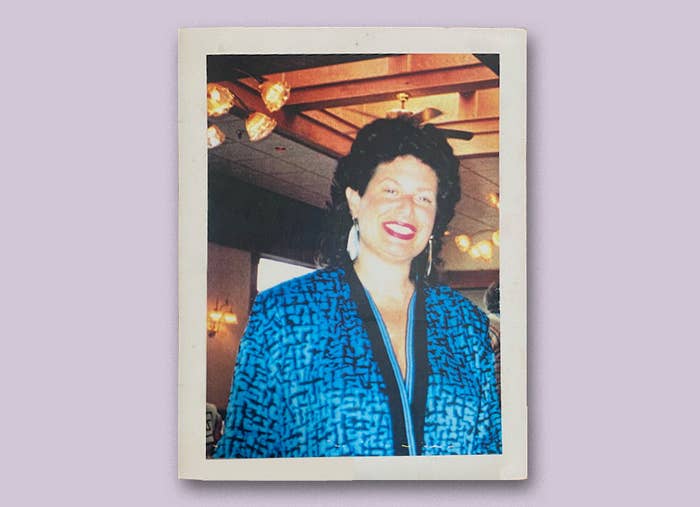
For as long as I can remember, I’ve known that the spelling of my name was unique. When people asked where it came from, Little Me would tell them I was named after my aunt who died while my mom was pregnant with me.
With age and a keen ear, Older Me absorbed more information: She had colon cancer. She was very young to have had colon cancer. She died at only 38. People told me that she always wore red lipstick, which in my mind became symbolic of her zest for life. She was free-spirited and a little wild, would try anything once — the opposite of me in so many ways.
I would occasionally stare at the painting of her in my mom’s bedroom, jealous that my brothers got to know her even briefly, wishing that some of her vivacity had rubbed off on me. But it wasn’t until I attended another family member’s funeral as a teenager and happened upon her grave, a headstone with my own uniquely spelled name on it, that it hit me — her cause of death could rub off on me, too.
The narrative I’d always heard about my aunt’s case was that it was extremely rare. She was a 34-year-old when she started to have symptoms. Eyes widen and jaws drop when I share this information.
Two different doctors shrugged off her rectal bleeding, chalking it up to hemorrhoids or IBS, and sent her on her way. A full year passed before she finally spoke with a specialist, who insisted on an immediate colonoscopy. The cancer was metastatic and had already spread to her liver.
Colorectal cancer — which includes cancers of the colon and the rectum, the last several inches of the large intestine — is the third most common cause of cancer-related death in the US, and the leading cause of cancer death in men under the age of 50.
But if there’s any good news about colorectal cancer, it’s that a colonoscopy can detect polyps, or fleshy groups of cells that form in the intestines, before they develop into cancer. Since polyps start out benign, doctors can remove them during a colonoscopy and greatly reduce a person's chances of developing colorectal cancer at all.
In fact, regular screenings and swift treatment could prevent a large proportion of colorectal cancer-related deaths, according to the American Cancer Society. Which is why my mom has always said that they should have caught her sister’s cancer earlier, and that she could very well still be alive today had she been properly screened when her symptoms started.
The thing is, they were right that my aunt didn’t fit the profile of the typical colorectal cancer patient at the time — most often a man 65 or older. Since then, experts have been alarmed at the increase in colorectal cancer cases in young adults in the US and around the world. About one in 10 colon cancers and one in four rectal cancers are now diagnosed in people under 50.
The change is so dramatic that in 2018 experts moved the recommendation for colorectal cancer screening from 50 to age 45 for people who are healthy and don’t have a family history of the disease. (People with a family history may need to start even sooner.) Unfortunately, young adults presenting with symptoms may still find that doctors aren’t considering colon cancer right away.
“From a primary care perspective, it's very easy to see a young person come in with some rectal bleeding and say, Oh, it's hemorrhoids. You're too young to have colon cancer,” said Benjamin Weinberg, associate professor of medicine and an attending physician specializing in gastrointestinal medical oncology at Georgetown University.
All of Weinberg's younger cancer patients have heard some variation of that from a healthcare provider, he said. They’re often told there’s no way their symptoms could point to colorectal cancer. They have no risk factors. They are too young.
What causes colorectal cancer?
Sometimes cancer happens for no reason whatsoever, and there’s almost no way to determine what causes any individual’s case. However, looking at the entire population, the American Cancer Society has determined that about half of colorectal cancer cases might be attributable to risk factors, including smoking, unhealthy diet (think more processed meat and fewer vegetables), high alcohol consumption, physical inactivity, and excess body weight.
However, those factors don’t explain the rise in young adults. “There's been this dramatic rise in young-onset colorectal cancer in the last 20, 25 years, and nobody knows why it's happening,” Weinberg said. “People who claim to know don't really know.”
Many of the younger patients they’re seeing do not have the typical risk factors associated with colorectal cancer — they’re often fit or very active, eat healthy, and don't necessarily lead a sedentary lifestyle. One patient that Weinberg has seen is now 50 and still runs six miles the day before every chemo session. Another case he saw on Twitter was a 38-year-old who was diagnosed between their sixth and seventh marathon.
All of this leads doctors to believe that there has to be some unknown environmental factor driving the increase in younger cancer diagnoses. There are not a lot of major genetic differences in the tumors in young- versus older-onset cancers. Dietary factors, like a meat-heavy or high-fat diet, or infection with viruses like HPV have been studied, but their role is still unclear. Some data suggest that a more diverse microbiome may be beneficial when it comes to disease risk in general, but nothing fully explains this new rise.
“The bottom line is, we don’t know,” said Andrea Cercek, a board-certified medical oncologist specializing in the treatment of gastrointestinal cancers at Memorial Sloan Kettering.
What should people at risk do?
My aunt Loren had some risk factors. She smoked, drank alcohol, and had a higher body weight. But colorectal cancer still seemed unlikely given that she was a young woman with no known family history.
Family history is the strongest risk factor for colorectal cancers, with an even higher risk when the relative was diagnosed before 50. Though I was vaguely, peripherally aware of this information having watched my mom suffer through semi-frequent colonoscopy prep, the perceived invincibility of youth created a brain block when it came to my own plan of care.
I’d gotten some mixed advice over the years, but no doctor had ever suggested that I begin screening imminently. Some had suggested that I might start in my 30s, while others said I needn’t deviate from the average risk recommendation, which is now to start colorectal cancer screening at 45.
I learned through a friend whose father was diagnosed at 35 that the screening recommendation is to start 10 years before the age that a first-degree relative was diagnosed. (A first-degree relative would be a parent, sibling, or child.)
Cercek told me that although the guidelines are looser for second-degree relatives (like a grandparent or an aunt), she would likely still recommend going by the 10-year rule.
My middle brother is 32, and his primary care doctor has been urging him to get a colonoscopy for a few years already. Finally, after another reminder at his most recent checkup, he made an appointment with the referred gastroenterologist. When he arrived at the gastroenterologist and said that he was not experiencing any digestive distress, he was sent home.
The most notable symptoms of colorectal cancer are changes in bowel habits that persist for more than a few days, like bleeding from the rectum. When a cancer is a bit more advanced, the symptoms can include unexplained weight loss or fatigue.
I have not experienced anything extreme, but digestive distress is my usual state of being. I’ve complained about it to plenty of doctors familiar with my family history. I’ve been to a gastroenterologist. They essentially seconded the TikTok diagnosis that I’m simply one of many girlies with IBS.
The frustrating part to me is that, according to Weinberg, most stage one colon cancers (which is early cancer that hasn’t spread) are only really identified via colonoscopy since they’re often not symptomatic. So why do our doctors not err on the side of caution? Why isn’t anyone on the same page about what we should do?
At my annual gynecological exam this past January, my doctor didn’t say anything about scheduling a colonoscopy, but she did ask if I’d done genetic testing to find out if my aunt had a genetic predisposition that was shared by my mom and passed on to me. I had not and honestly didn’t know anything about the potential genetic component.
Lynch syndrome is the most common hereditary condition that can cause early onset colorectal cancer, Cercek explained. It’s often found in individuals who develop colorectal cancer under the age of 50, but it’s also associated with other cancers higher up in the intestinal tract and in the stomach, as well as some gynecologic cancers including ovarian, uterine, and kidney cancer.
She said that my situation would be prime for testing due to the age my aunt was diagnosed, though my mom had no recollection of hearing about the test or the syndrome back then and only recently decided to get tested. If my mom doesn’t have it, there’s obviously no way I could have inherited it. Even if she does have it, it’s still possible that I don’t. I’m not sure I want to know either way.
It’s not that I don’t want to do all the necessary screenings and preventive care; it’s that I want to do it regardless of what my testing tells me. I could have the gene and never get cancer, or I could not have it and still get cancer. I prefer to err on the side of caution when not doing so may result in death.
Whether my insurance will support me in that or not remains to be seen, but I plan on finding out shortly when I insist on scheduling my first colonoscopy at 29.
The surge in younger people with colorectal cancer feels like an additional increased risk for me, someone who already has a family history of young-onset colon cancer. People like Cercek and Weinberg are continuing to investigate the cause, but as of now, they don’t have any answers. They can’t impart newfound wisdom as to how I can live my day-to-day life in a way that will lessen my risk.
“The best we can do is to just share that this is happening,” Cercek said. “And that if someone has symptoms, they should seek medical attention sooner rather than later, because it truly can save their life.” ●
